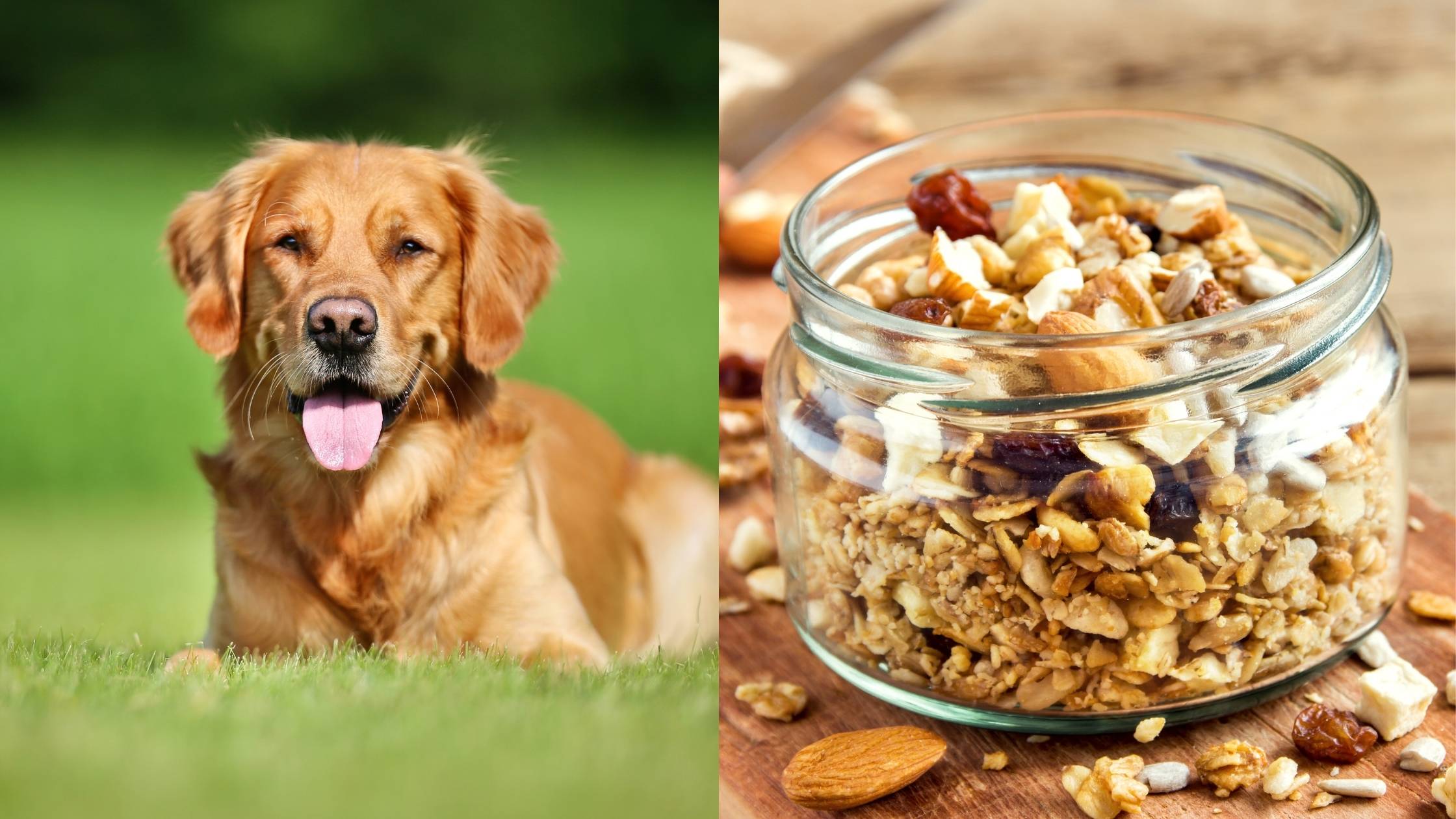Last Updated on 11/17/2021 by Veronica Jones
Humans can enjoy granola in so many ways. Sprinkle it on top of yogurt or ice cream or serve it with milk in the mornings. Naturally, pet owners want to share good things with their pooches. But is granola a healthy breakfast or snack choice for dogs too?
Read this article to find out if granola is the right option for your furry friend, along with some facts, recipes and guidance.
Can dogs eat granola?
Yes, most types of granola are considered safe for dogs to consume, however some granolas contain harmful ingredients that should be avoided. The main ingredients of granola are rolled oats or puffed brown rice, both of which are non-toxic to canines. Raisins, nuts and chocolate though can harm your pup, all of which are typically added to granola recipes for flavor and natural sweetness. In short, as long as you carefully check the ingredients, granola is okay for dogs to eat.
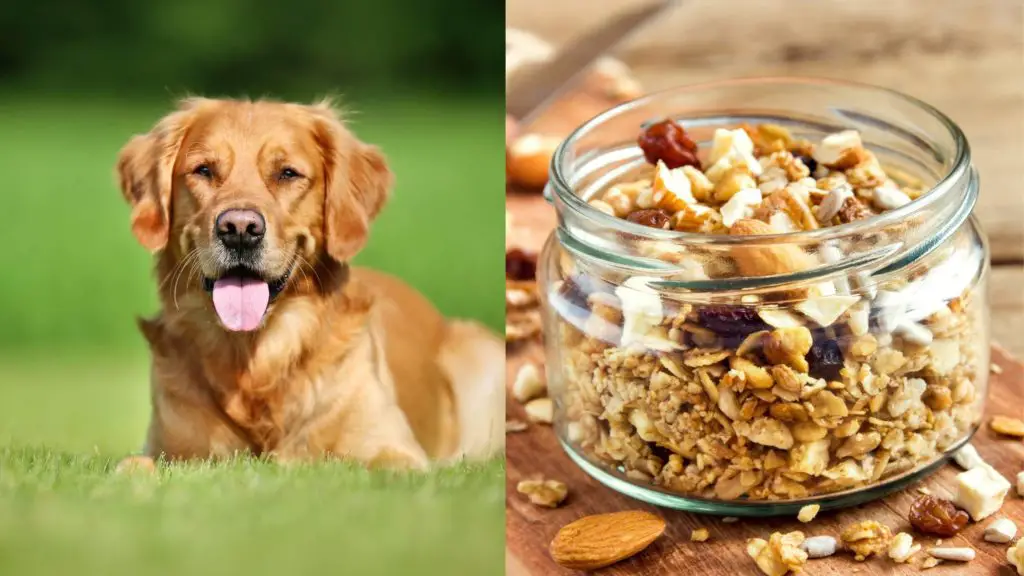
Does granola provide any nutritional benefits to pups?
If your dog eats canine-safe granola in the right amounts it can provide the following nutrients:
Potassium – this essential mineral helps to maintain muscle and improve blood function. If your dog’s potassium levels are low it can affect heart, nerve and muscle functionality. A lack of appetite, muscle pain, loss of muscle mass, paralysis of the muscles, vomiting or lethargy can indicate that your dog isn’t getting enough potassium in his diet.
Calcium – dogs need calcium for healthy and strong teeth, bones, nails and coat. For dogs, calcium also boosts their nervous system.
Fiber – fiber is important in a dog’s diet because it ferments into fatty acids which then help to prevent bad bacteria from growing. Fiber is also believed to reduce the risk of colon cancer in dogs. Too much fiber can cause diarrhea and gastrointestinal upset though, so it’s important to get the balance right.
Protein – essential amino acids in protein helps your dog’s body to function correctly. Healthy skin, coat, muscle development and repair are just a few benefits that protein provides.
Carbohydrate – like humans, dogs need carbohydrates for energy. Carbohydrates generate heat in a canine’s body and some even convert it into fat.
Never replace your pup’s usual dog food for granola.
Harmful granola ingredients to avoid
Whilst there are some health benefits that canines can gain from eating granola, there are also some dangers to be mindful of. Here are some that could harm your dog if consumed.
Raisins – dried fruit is a common addition to granola to add natural sweetness. Raisins are dried grapes and are so poisonous to dogs that even one raisin could lead be fatal to dogs. The consumption of raisins can also lead to acute kidney failure. Signs of toxic ingestion in your dog include:
• Vomiting and diarrhea
• Tender abdomen
• A loss of appetite
• Dehydration
• Increased thirst and excessive urination
If you think your pup has ingested raisins, emergency care is crucial and could be a matter of your pup surviving or not. Your vet may suggest inducing vomiting, but this should only be done under the instructions of a medical professional. If your dog is showing signs of shock or difficulty breathing, inducing vomiting will not be recommended.
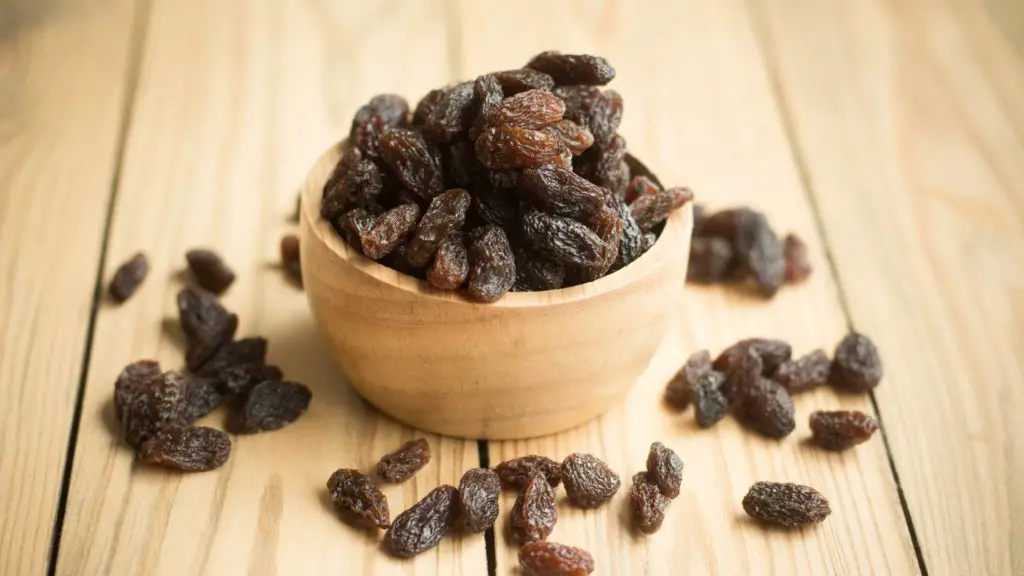
Chocolate – the theobromine content in chocolate granola makes it poisonous to dogs. Why is it toxic to dogs? Canines can’t process the theobromine or caffeine found in chocolate quickly, which means that toxic compounds are released and can build up inside a dog’s body. Dark chocolate contains the highest levels of theobromine, making it the most dangerous to canines. As dark chocolate is the healthiest to humans, it is often found in granola recipes. Signs of chocolate toxicity include:
• Seizures
• Tremors
• Irregular heartbeat
If your dog consumes large amounts of chocolate, you should contact your vet immediately for advice.
Nuts – some nuts are toxic to animals, including dogs. Nuts are a common ingredient in granola so it’s important to know which ones can cause harm so you can check the ingredients. Even dog-safe nuts such as peanuts and cashews contain high levels of fat and salt, making them an unhealthy snack or meal supplement.
Nuts to avoid giving your four-legged friend includes:
Macadamia nuts – although the reason why these nuts are particularly dangerous to dogs is unknown, studies have proven that even small quantities can have serious consequences for your canine friend.•
Almonds – despite not being toxic, a dog’s digestive system can’t digest almonds which could cause gastrointestinal problems. The large size and shape of almonds could also cause a choking hazard by getting stuck in a dog’s windpipe. Almonds typically also contain seasoning or chocolate coatings that are not suitable for dogs to consume.
Choking and blockage hazard
Dog owners know that canines love to wolf down their food quickly. The tiny, hard chunks and small pieces found in granola could pose a choking hazard for pups. The consumption of too many nuts and seeds could also cause a blockage or obstruction in a dog’s body, requiring veterinary care.
High sugar and fat levels
Too much sugar and fat in a canine’s diet can lead to weight gain, cavities, diabetes and heart disease.
Can dogs eat granola bars?
Granola bars are designed for human consumption and contain high levels of sugar and other ingredients that are not safe for dogs to eat such as raisins and chocolate.
You can give your pup a bite of your granola bar snack if it doesn’t contain any toxic ingredients but only do so occasionally as the sugar can cause health issues such as diabetes and obesity. Making your own granola bars is a safer and healthier option.
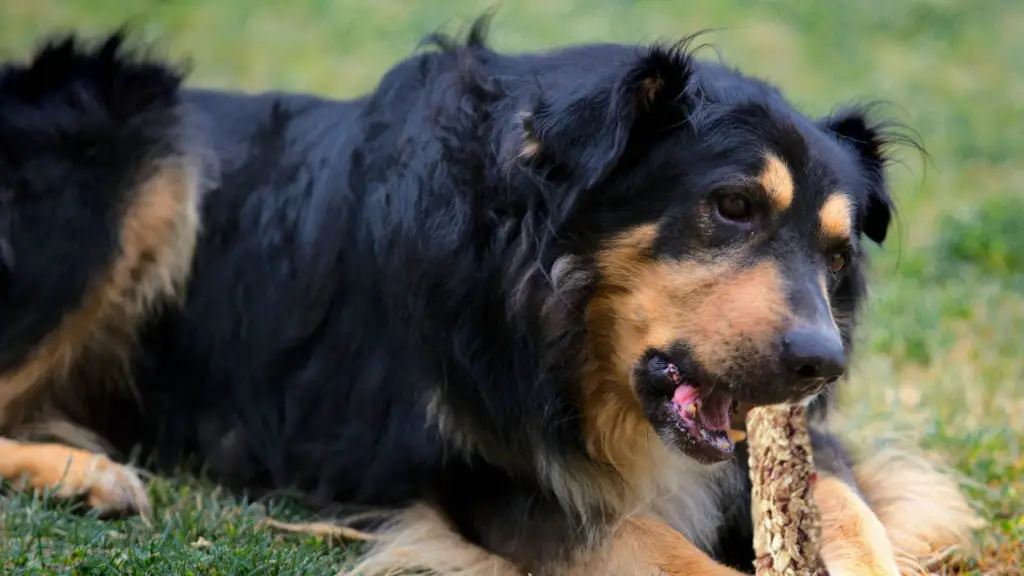
Can dogs eat peanut butter or honey granola?
Peanut butter that doesn’t contain any chocolate or xylitol is safe to add to granola for your pooch to enjoy. Honey is also safe in small quantities so can be added to the granola as a sweetener. Honey has a very high sugar content and can cause tooth decay and obesity if eaten regularly. It’s recommended that you brush your dog’s teeth after he eats honey to keep them healthy.
Can puppies eat granola?
A puppy’s digestive system is particularly delicate as they are growing. This means that the fiber in granola could cause diarrhea. Even in fully grown dogs, too much fiber can cause gastrointestinal upset. Whilst granola won’t cause any long-term harm to puppies, it’s not advised as part of their puppy diet.
Dog-friendly granola recipes
Granola is simple to make and many people choose homemade over store-bought so they can limit the amount of sugar that is added.
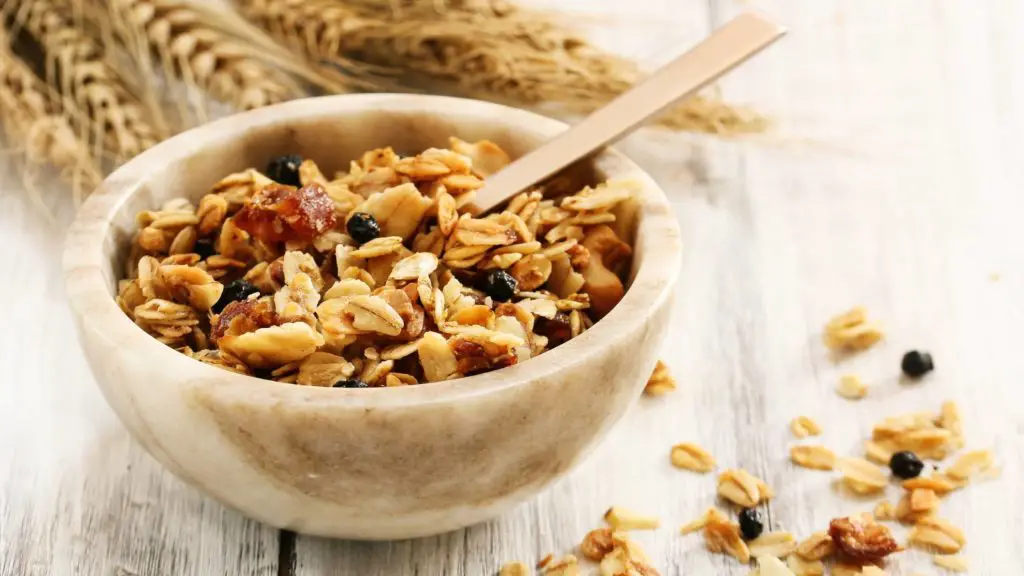
Here are a few of our favorite recipes to try.
Rolled oat dog treats
Spoil your pup with these healthy, tasty treats.
Ingredients:
• Rolled oats (5 cups)
• Eggs (2)
• No added sugar applesauce (1 cup)
Method:
1. Preheat your oven to 350°F (177°C).
2. Blend the oats into a fine powder using a food processor.
3. Add the eggs and applesauce and blend for a few more minutes.
4. Use a tablespoon to measure out the treat size and flatten it into a disk by using a fork.
5. Transfer the treats to a lined baking tray and bake in the oven for 20 minutes.
Leave the treats to cool completely before serving to your pup. Store in an airtight container in the fridge for two weeks or freeze them.
Granola peanut butter bars
If you want to feed your dog granola bars, this recipe is for you. Most dogs love peanut butter, making this dog-safe version of a granola bar irresistible to pups.
Ingredients:
• Rolled oats (2 cups)
• Pumpkin seeds (1/4 cup)
• Sunflower seeds (1/4 cup)
• Flax seeds (1 tbsp)
• Grated coconut (2 tbsp)
• Chopped dried apples or blueberries (2 tbsp)
• Coconut oil (1 tbsp)
• Honey (1 tbsp)
• Egg (1 – slightly beaten)
• Dog-safe, unsalted peanut butter (1 cup). You can easily make your own by blending unsalted peanuts, honey and chia seeds.
• Almond milk or low-fat yogurt (1 cup)
Method:
1. Preheat your oven to 325°.
2. Line a baking sheet with parchment paper and sprinkle some flour onto the surface.
3. Use a food processer to blend all of the seeds together.
4. Mix together the remaining dry ingredients in a separate bowl.
5. Heat the coconut oil and honey in a pan until slightly softened.
6. Beat an egg in a small separate bowl.
7. Blend the peanut butter, almond milk or yogurt in a food processor.
8. Add the egg, oil and honey and blend again.
9. Add the wet ingredients to the dry and mix by hand.
10. Shape the mixture into balls approximately one inch in size and place them on the baking sheet. If the mixture is too wet, add some whole-wheat flour.
11. Bake in the oven for 30-40 minutes until golden brown. Turn halfway through the cooking time.
Leave to cool completely before serving to your pooch. Store in an airtight container or freeze them for another day.
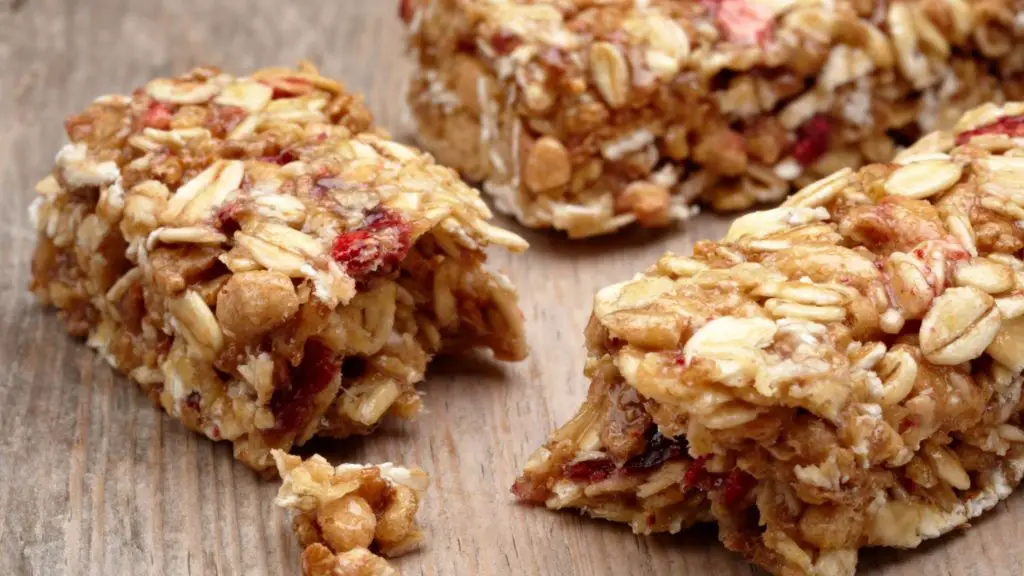
Berry granola
Your pooch will love this fiber and protein-packed breakfast, especially if he has a sweet tooth.
Ingredients:
• Rolled oats (1/4 cup)
• Water (1/2 cup)
• Egg (1, lightly beaten)
• Dog-safe berries (blueberries, strawberries and raspberries)
Method:
1. Heat the oats and water in a saucepan until just warm.
2. Add the beaten egg and cook for two minutes.
3. Stir in the berries and cook for a further two minutes.
Allow to cool before serving to your dog as a nutritious breakfast or healthy snack.
Dogs and granola
All human foods are best shared with our beloved pets in moderation, and that includes granola. If your favourite type of granola is nut or raisin, eat it yourself and don’t share it with your pet. Baking homemade granola or granola bars is the best way to ensure your pup won’t come to any harm from eating granola. Always check a reliable source to find out what foods you should avoid feeding your pet if you’re unsure.
Looking for More Great Articles About What Your Dog Can (or Can’t) Eat?
- Can Dogs Eat Orange Chicken? Is it Safe?
- Can Dogs Eat Coleslaw? What are the Risks?
- Can Dogs Eat Salsa? Can it Harm Them?
- Can Dogs Eat Dragon Fruit? Everything You Need to Know
Reference list
- AKC “can dogs eat honey” https://www.akc.org/expert-advice/nutrition/can-dogs-eat-honey/ Accessed 23rd October 2021
- PET MD “the importance of carbohydrates in dogs” https://www.petmd.com/dog/nutrition/evr_dg_whats_in_a_balanced_dog_food Accessed 23rd October 2021
- Purina “can dogs eat nuts” https://www.purina.co.uk/articles/dogs/feeding/what-dogs-eat/can-dogs-eat-nuts Accessed 23rd October 2021

